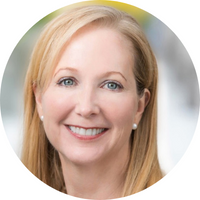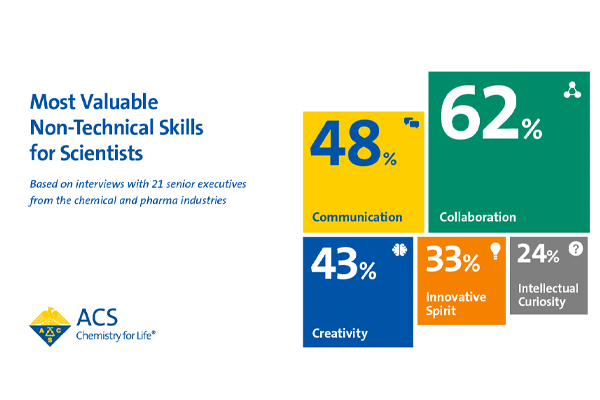
Key Takeaways:
- Wendy Young shares ways Genentech mitigates challenges women face in the workplace
- Young gives early-career scientists a key piece of advice
What are the non-technical skills you most highly value in scientists at Genentech? And why?
It takes a strong team of individual, highly talented scientists working together to develop a new innovative medicine. In those individual scientists, we value a wide variety of non-technical skills: excellent communicators, good listeners, great collaborators, risk takers, motivators, truth seekers – and, most importantly, a clear passion for helping patients.
Female chemists face unique challenges in the workplace. What have you seen (at Genentech or elsewhere) that mitigates this situation?
Building a culture of inclusion starts at the top. I truly believe that Genentech has developed, and continues to nurture, an inclusive culture and that our leadership values all of its scientists regardless of gender, race, ethnicity, or background.
I don’t deny that at times during my career, it has felt awkward being the only female in the room. But I appreciate that Genentech has spent more than a decade deliberately focusing on ways to develop women and to ensure that they have access to the kinds of opportunities, roles, and responsibilities to contribute at the highest levels.
Specifically, we’ve increased our efforts to recruit more women, and to develop them for broader responsibilities and leadership positions. We’re also working with hiring managers to be cognizant of unconscious bias and to ensure that hiring decisions are based on true competencies. And we’ve created several internal groups aimed at evolving company practices to better support women in the workplace: Genentech Women Professionals, Genentech Women’s Officer Group, and Genentech Women in Science and Engineering (gWISE). gWISE is specifically devoted to identifying and addressing the unique challenges that women in R&D, including chemists, face.
Over the past decade, we have more than doubled the number of female officers (VP-level and above) at Genentech from 15% to 40%. In this time, we’ve also brought 14 innovative new medicines to patients. Our continued focus on diversity of all types has been critical to these scientific advances.
When it comes to inclusion, I believe a company truly needs to walk the walk, not just talk the talk—and that the most important step a company can take is to ensure that different perspectives are part of the conversation and people from all backgrounds feel valued.
For those of us outside of the biotech/pharma industry, can you think of an analogy that helps us understand the level of difficulty in developing a commercially successful drug?
Drug discovery is incredibly challenging. Scientists are working to optimize and balance so many different properties—potency, solubility, cell permeability, stability, toxicity—all at once to make a promising new medicine. It takes a lot of trial and error and iterations to get it right. The closest analogy for me is the gymnast who must jump, leap, and twirl across a thin balance beam and then do a flip and dismount perfectly on both feet – time after time. When I see a gymnast accomplish this, I am always amazed, but I know it is the result of practice time and again by an experienced athlete. Drug discovery feels the same in many ways—there is trial and error, managing so many different variables and also learning from mistakes, practice, and a can-do, never-give-up attitude.
You have spent substantial time volunteering on behalf of the ACS Medicinal Chemistry Division. What motivates you in doing so?
Being involved in the ACS has been terrific on so many levels and more valuable than I realized it would be when I joined years ago. Initially, I saw it as an opportunity to “hang” with scientists I never would have met otherwise. But after so many years, I realize that I’m motivated to continue volunteering because I’m still benefiting tremendously from the ACS national meetings and MEDI programming. They provide a fantastic opportunity to connect with world-class chemists and drug hunters. The wealth of information and camaraderie is so cool and inspiring. Face-to-face interaction beats reading the information from journals any day. I leave each meeting with new friends, contacts, ideas and information that will help us collectively push the frontiers of drug discovery and medicine development forward.
If you had to give advice to a young scientist, what would you tell them?
I have a short list: Focus on what really matters; accomplish something important and keep amassing those accomplishments on your CV; be humble, honest, and transparent; be an inclusive leader; speak up; continue to improve your professional leadership skills; remember that all journeys have bumps in the road; and, finally, know what you stand for and be true to your values. When you know what you stand for, you can achieve anything.
The east coast is where you received all of your higher education. What do you miss about spending time there?
I so miss warm summer nights! Growing up in New York we would have evening BBQs and be outside for hours talking and playing games. Where I live in the San Francisco Bay Area, the sweaters and warm slippers come out when the sun sets. Summer can be chilly. I even have a heater under my desk at work, which I use in the summer, too.

Wendy Young is senior vice president of Small Molecule Drug Discovery at Genentech. She oversees an organization of ~400 scientists all working to discover new medicines for patients. Wendy has spent the last 25 years engrossed in the discovery of molecules to treat cancer, cardiovascular and immunology diseases and under her leadership numerous compounds have moved into clinical trials.
This article has been edited for length and clarity. The opinions expressed in this article are the author's own and do not necessarily reflect the view of their employer or the American Chemical Society.
Copyright 2019 American Chemical Society (All Rights Reserved)








